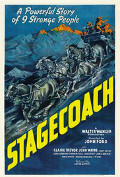
Directed by
John Ford
96 minutes
Rated PG
Reviewed by
Bernard Hemingway

Stagecoach
With this Western John Ford and his long-time collaborator, screenwriter Dudley Nichols, established a style that became the template and benchmark for this paradigmatically American genre - heroic, redemptive, populist and triumphalist, cinematically panoramic and with a roster of genre archetypes not least of which is provided by Ford’s icon of frontier nobility, John Wayne, in his first collaboration with the director, Ford's equally iconi location, Monument Valley on the border of Utah and Arizona, which is handsomely captured by cinematographer Bert Glennon who would also photograph Rio Grande and Wagon Master (both 1950) for Ford
Nichols' script is based on a short story by Ernest Haycox, ‘Stage to Lordsbur,’ about a group of people travelling on a stagecoach across the wild frontier, a story which as has often been observed, bears more than a passing resemblance to Guy De Maupassant's1880 short story 'Boule De Suif'. Crammed into the coach (the photographing of the interior scenes is a testament to Glennon’s skills as much as his rendering of the landscape), the roster of types includes dipsomaniacal "Doc" Boone (Thomas Mitchell); John Carradine’s Southern gentleman gambler. Dallas, a woman of easy virtue and her polar opposite army wife Mrs. Mallory (Louise Platt); Mr. Gatewood, an absconding banker; Mr. Peacock (Donald Meek), a timid whisky salesman, and Wayne’s Ringo Kid who has escaped from prison in order to avenge his murdered father and brother. The driver is familiar Western comic relief actor Andy Devine whilst another Western regular, George Bancroft rides shotgun as Marshal Curley Wilcox.
Nichols’ screenplay is hokey, sentimentalized stuff that hews close to the stereotyped characterisations and anyone judging the film by today’s standards of action or candour will most likely be disappointed as in dutiful fashion the Redskins are mown down and Wayne and the cavalry save the day.
The film’s resolution however is rather odd. The dramatic centrepiece of the film is the evolving relationship between Dallas and Ringo, both in their own ways social pariahs and by the latter stages Nichols has Dallas pleading with Ringo to forget his planned revenge so that they can go and live happily together on Ringo’s ranch. Ringo seems persuaded but in the end decides vengeance is preferable. If this moral implacability comes across as inexplicably perverse in the context of Nichols' narrative, at least from our modern perspective (as exemplified by Westerns from Lawman (1972) to Unforgiven (1992) it is anti-heroically heroic. The film however ends with a cake-and-eat-it-too ending in which Ringo gets his revenge and the girl and they are both saved from “the blessings of civilization” thanks to the complicity of the law (and the backing of a drunk of a doctor). Whether it's glib or, for its day, subversive (the Hays office apparently was not concerned) is a matter for debate.
FYI: The film was remade in 1966 in the vacuously ersatz style ot the period with jobbing actor Alex Cord as Ringo, Ann-Margret as Dallas and in his last feature film, Bing Crosby as Doc Josiah Boone. Its sole achievement was that director Gordon Douglas managed to comprehensively jettison every virtue of Ford's original.
Want something different?





